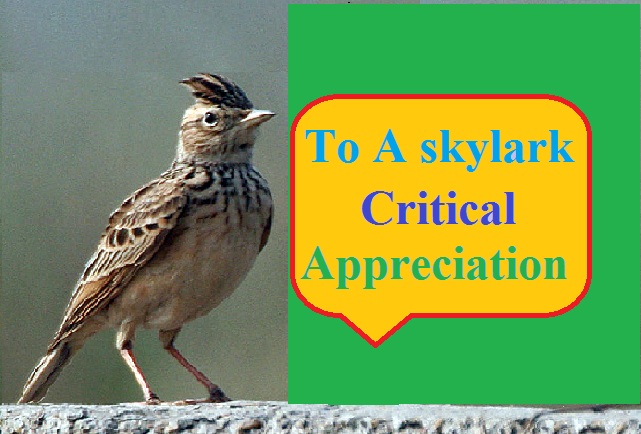To a skylark critical appreciation is going to be discussed. Dear students hope everything is going perfect. Today i am going to discuss about poem ode to a skylark critical appreciation or to a skylark critical analysis. The discussion will be also provide to a skylark theme and summary also. Hope you will like my discussion.
Table of Contents
To a skylark critical appreciation
“The ode o a skylark” by Shelley is one of the most famous poems in the English language. Shelley in this ode captures the carefree nature of a bird the skylark. The speaker depicts the distinguishing characteristic of a skylark as beautiful and happy.
The poet here is the poem tries to make contrast the sorrow of human life with the joy of the skylark. The speakers attitude and relationship toward the bird is one of the praise or worship. Rhetorical or literary terms and mechanics such as metaphors, diction, imagery and tone which are all used to create these effects.

Blithe Spirit in Skylark
The poet begins the poem with an address or apostrophe. He has addressed the bird as the “Blithe Spirit”. It is the endless source of pleasure. The skylark flies higher and higher. It never comes back to this world. Like a cloud of fire it rises up. When the sun is going to set, the whole western sky becomes purple and the skylark flies in the reddish region of the sky without any weariness. The poet has compared the bird with a poet who remains hidden in the light of thought.
“Like a poet hidden
One the light of thought
Sinning hymns unbidden
Till the world is wrought
To sympathy with hopes and fears it hidden not”.
The bird is also like high born lonely maiden who sings sweet songs but remains unseen. It is a think which is likes a golden glow- worn, scattering light among the flowers and grass in which it is hidden. It is a think which likes a rose embowered in its own green leaves whose scent is blown by the wind until the bees are faint with “too much sweet”.
The song of the skylark is an idealism of Shelly. It remains ever fresh and ever perfect. The song of marriage or the song of triumph can ever approach that of the skylark because of its purity and holiness. We can never enjoy absolute peace and happiness because we are not able to avoid sin and crudeness. The poet says in this poem in the following ways:
“Our sweetest songs are those that
Tell of saddest thought.”
The pom Skylark marvel of music and melody
This poem is a marvel of music and melody. The sweetness of the poem combined with its other qualities make it a lyrical masterpiece. The music of the poem is simply irresistible. The following stanza may be quoted not only because of its musical quality but because the truth that it contains:
“We look before and after
And pine for what is not
Our sincerest laughter
With some pain is fraught
Our sweetest songs are those that tells of saddest thoughts”
Solidity of feeling in ode to skylark by P.B Shelly
There is an solidity of feeling throughout this poem. It is a passionate utterance. The poet’s heart is overflowing with the flood of emotion.
All Shelly’s lyrics posses a spontaneous quality. This poem is no exception. It is a pure effusion. It is a authentic example of lyrical gift of Shelly. If the west wind was Shelley’s first aesthetic philosophy through metaphors of nature. The bird skylark is his greatest natural metaphor for natural poetic jinks the “harmonious madness” of pure inspiration.
Above all this discussion, we consider it as Shelley’s remarkable and lyric poem.
For your better understanding, you can check the following video about to a skylark critical analysis .
So students, hope you have enjoyed my discussion about to a skylark critical analysis. Please share my writings with your friends.
Read More Literary Writings:
To His Coy Mistress Analysis And Summary By Andrew Marvell
Somebody Once Told Me The World Was Macaroni Lyrics
The Love Song of J. Alfred Prufrock represents conflict of modern man
Robert Browning as a writer of dramatic monologue
Tennyson as a representative poet of his age or Victorian Period


